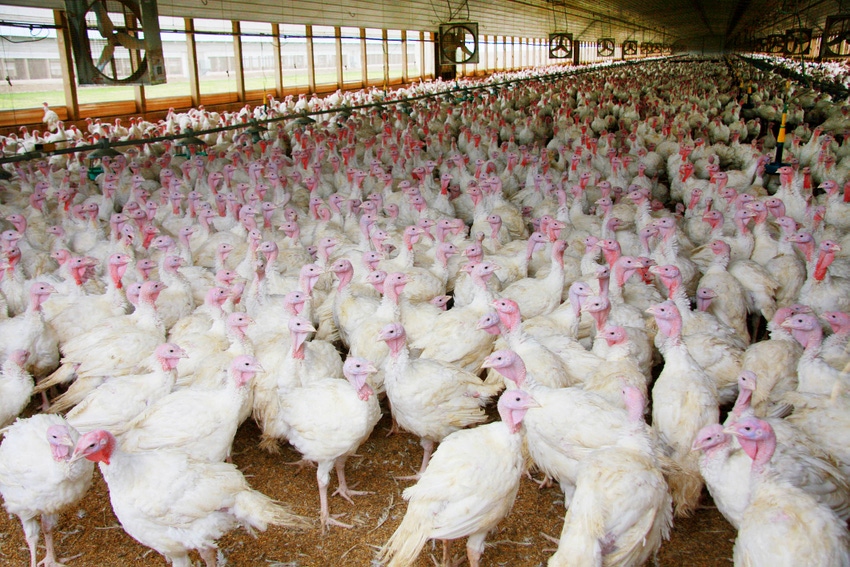While low-pathogenic avian flu and Newcastle outbreaks have been confined to California, poultry producers nationwide should review biosecurity plans.

The California Department of Food & Agriculture (CDFA) continues to urge poultry producers ��— backyard and commercial — to review and implement biosecurity plans as the state found additional cases of low-pathogenic avian influenza (LPAI) in commercial turkeys and virulent Newcastle disease in backyard exhibition flocks.
In Stanislaus County, Cal., CDFA and the U.S. Department of Agriculture have been testing flocks in a 10 km zone around an initial case of LPAI H7N3 in commercial turkeys. A second flock was detected earlier in September, and both flocks have been euthanized and disposed of to stop further spread, CDFA said.
On Sept. 23, CDFA said two more flocks were identified within the 10 km zone that tested positive for LPAI H7N3: one commercial organic turkey flock and one small mixed poultry organic flock. Of the four cases, CDFA said three were participating in the National Poultry Improvement Plan (NPIP), which is a cooperative industry, state and federal program established to test and monitor several poultry diseases, including avian influenza.
CDFA said the other 18 flocks in the 10 km zone continue to test negative for avian influenza.
California's other ongoing poultry health situation has been virulent Newcastle disease virus in exhibition birds in counties in southern California. CDFA and USDA have been conducting enhanced surveillance and epidemiological investigations of the Newcastle outbreak.
On Sept. 28, the World Organization for Animal Health (OIE) issued a notice that USDA and CDFA had detected the virus at a live bird market in Los Angeles County, Cal. State officials have quarantined the affected premises and implemented movement controls, OIE said, and the market has been depopulated, cleaned and disinfected. Live bird markets in the area have been ordered to close for a day to perform cleaning and disinfection with environmental sampling, the OIE notice said.
Virulent Newcastle disease, formerly known as exotic Newcastle disease, is a contagious and fatal viral disease affecting the respiratory, nervous and digestive systems of birds and poultry. The disease is so virulent that many birds and poultry die without showing any clinical signs, USDA said.
Virulent Newcastle disease is not a food safety concern. No human cases of Newcastle disease have ever occurred from eating poultry products. Properly cooked poultry products are safe to eat. In very rare instances, people working directly with sick birds can become infected with mild symptoms.
Since May 18, USDA has confirmed 147 cases of Newcastle disease in backyard birds in California: 95 in San Bernardino County, 21 in Riverside County, 30 in Los Angeles County and 1 in Ventura County.
Biosecurity
For both avian influenza and Newcastle disease, regardless of location, it is essential that all bird owners follow good biosecurity practices to help protect their birds from infectious diseases, USDA said. These simple steps include:
* Washing hands and scrubbing boots before and after entering an area with birds;
* Cleaning and disinfecting tires and equipment before moving them off the property, and
* Isolating any birds returning from shows for 30 days before placing them with the rest of the flock.
All bird owners should report sick birds or unusual bird deaths to state/federal officials, either through their state veterinarian or through USDA’s toll-free number at (866) 536-7593.
On CDFA's commercial poultry biosecurity webpage, the agency says disease risk cannot be completely eliminated from a poultry premises. Well before a disease outbreak event, premises management personnel, in consultation with a veterinarian, should conduct a biosecurity risk assessment of all facilities they manage and the biosecurity practices at each location. It is important to evaluate the level of risk and then determine measures needed to address and improve the risk areas of concern -- in advance of a possible avian disease outbreak.
CDFA has a guide that gives poultry producers or farm managers the opportunity to assess their current level of on-farm biosecurity. Answers will provide an idea of where areas of weakness exist on an operation that require attention or practices that fall below current industry standards. Each response in the guide is rated as Minimal Biosecurity Risk, Medium Biosecurity Risk or High Biosecurity Risk.
Additional information
* Know the Signs of Disease and How to Report Suspected Illness
* English/Spanish Information on Exotic Newcastle Disease
* Epidemiologic Analyses of Virulent Newcastle Disease in Backyard Birds in California: August 2018 Report
About the Author(s)
You May Also Like


.png?width=300&auto=webp&quality=80&disable=upscale)
